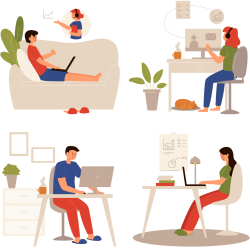October 18, 2022
Monitoring remote workers is a good idea according to half of bosses
 A new poll from the CIPD and HiBob claims that more than half of bosses (55 percent) agree with collecting information on regular home workers, including the amount of time spent on laptops each day and email sending behaviours to identify risk of burnout. However, only three in ten (28 percent) leaders say their organisations are using software for monitoring remote workers and their productivity, according to the study. Where workplace monitoring is in place, the CIPD and HiBob urge employers to consider its purpose, and to be clear to staff about what is being monitored and why. More →
A new poll from the CIPD and HiBob claims that more than half of bosses (55 percent) agree with collecting information on regular home workers, including the amount of time spent on laptops each day and email sending behaviours to identify risk of burnout. However, only three in ten (28 percent) leaders say their organisations are using software for monitoring remote workers and their productivity, according to the study. Where workplace monitoring is in place, the CIPD and HiBob urge employers to consider its purpose, and to be clear to staff about what is being monitored and why. More →



































September 12, 2022
The wellbeing of parents should be a greater concern for employers
by Gosia Bowling • Comment, Wellbeing